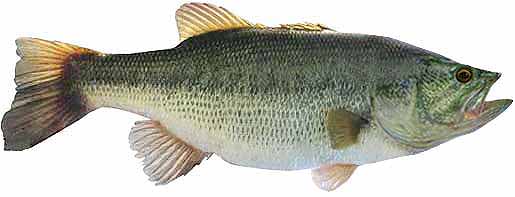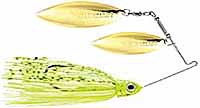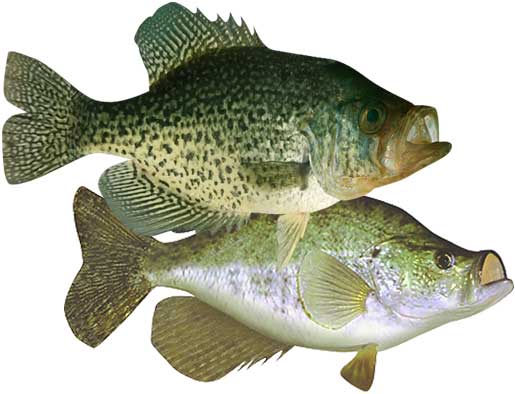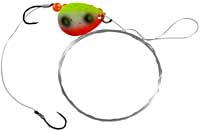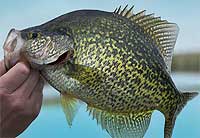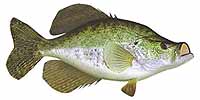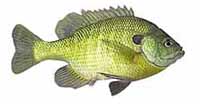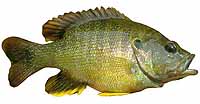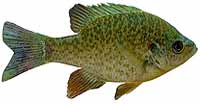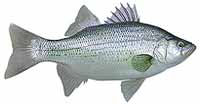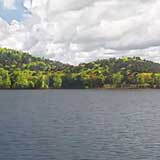Fishing Report For Broken Bow Lake, OK
By Rick Seaman
Last updated on .
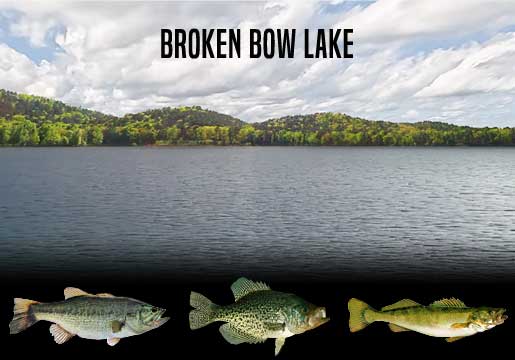
Fishing Reports
Popular Fish Species Broken Bow Lake, OK
Fishing Report: Largemouth Bass
Current Fishing Report: Good
Bass fishing is currently experiencing major changes in the way anglers are approaching the sport. The expanded use of high-tech fish finders is giving anglers, who fish from a boat, a distinct advantage. The fishing hasn't really changed, but the catch rate has increased considerably. The advent of new lures and equipment has improved success for anglers fishing from the bank as well. Savvy anglers, who study bass patterns, continue to catch nice fish, with or without the new gadgets.
SUMMER. Water temperatures are in the mid to upper 80's and bass are feeding shallow, early and late in the day. They are being caught on topwater, crankbaits, spinnerbaits and swimbaits. Wacky-rigged stick worms are catching finicky bass when the bite is slow. Largemouth bass here feed on gizzard shad, threadfin shad, small sunfish and crawfish. During the hotter parts of the day, they are being caught deeper on points, channel edges, and ledges 15 to 30 feet deep. Smallmouth and spotted bass reside here, but largemouth are the dominant species, especially for larger fish.
FALL. When Fall arrives, bass here will follow schools of baitfish into coves and shallow bays where spoons, swimbaits, and slow-rolled spinnerbaits have been successful in prior years.. As deeper water cools, bait and bass move out to ledges, channel edges, points and humps where flutter spoons are often the ideal bait.
WINTER. Winter will isolate bass around slightly deeper structure, flats, points, and creek channels. They can be found from 15 to 25 feet deep. Here they hold, feeding less frequently, awaiting warmer water to return in Spring.
SPRING. Once water temperatures rise into the low 60's, largemouth will move from deep wintering holes, to shallower water just outside spawning areas. Jerkbaits, spinnerbaits and vibrating jigs typically get bites just away from the shoreline. At this time they are preparing for the spawn. Once water warms into the mid to high 60's, they will move into 1 to 4 feet of water, and create nests, then lay their eggs. Immediately afterwards, females move to deeper water and males remain to guard the eggs, and then the fry. After a couple weeks, the males also move to slightly deeper water. Crankbaits, vibrating jigs, plastic worms and swimbaits are catching bass during this period.
Fishing Report: Black & White Crappie
Current Fishing Report: Fair To Good
Both black crappie and white crappie reside here with white crappie the more dominant species.
SUMMER. Water temperatures are currently in the mid to high 70's, and crappie fishing has been very good. Now that the spawn is over, and the hot Summer sun is warming the shallows, crappie have retreated to depths of 18 to 25 feet. Some crappie embed in the shade of heavy vegetation, in slightly shallower water. This is a good time to focus around submerged, standing timber. Anglers are also locating schools of crappie hanging over deep points, above rocky structures and around creek channel edges.
FALL. Baitfish, which will be moving into shallow flats, coves and bays, will draw crappie into these areas, where they will feed heavily in preparation for the cold Winter. Small spoons, along with minnows, hair jigs, and crappie jigs, are good options during this feeding marathon.
WINTER. Once the shallows start cooling rapidly, crappie will migrate to deeper holding areas, mostly off shore. At this time they are typically caught using a very slow presentation, in 20 to 35 feet of water. Even though they are not in contact with the bottom, they are relating to some cover, or structure change, directly below them.
SPRING. In early Spring, crappie begin staging in 8 to 12 feet of water, just outside shallow spawning bays and flats. Spring is the ideal time to be on the water, as crappie have moved shallow to spawn. At that time, they are typically caught in 2 to 4 feet of water. Docks, brush, wood and vegetation are where most anglers are catching good numbers using small crappie jigs or live minnows. After the spawn, crappie move outside the spawning area and typically hold deeper on the closest cover. Once they move off the beds, anglers are reporting good success using fish finders and forward facing sonar to locate schools of crappie, which tend to stack vertically around cover. Light tackle with 4 lb to 8 lb line is a popular choice.
Fishing Report: Walleye
Current Fishing Report: Good
A lot of walleye are being caught using new technologies, cutting down on the time it takes to locate them. Forward-facing, and side scanning, sonar is assisting anglers, fishing from a boat, to locate fish. Fishing is better as anglers can focus on areas with good numbers of walleye. This is true for either trolling or casting. Anglers fishing from the bank still have to search the old fashion way, via test casting, until a school is located.
Spring and Fall are the best seasons for catching walleye, as they spend a great deal of time shallow.
SUMMER. Currently the water temperature is in the mid 80's, and walleye fishing is slow during the middle of the day. Throughout Summer, early in the morning, and from dusk to long after dark are good times to catch walleye. At those times they move shallow to feed in low-light conditions. Night fishing has been good, as well. The rest of the time they are cruising flats and creek channel edges, where they are harder to locate and catch. When the bite is slow, minnows, grubs and nightcrawlers, fished just off the bottom is catching walleye, and using a bobber can be helpful.
FALL. Fall brings cooler temperatures to shallow water, drawing walleye and baitfish into the shallows. Jigs, swimbaits, spoons, crankbaits, jerkbaits, and spinnerbaits are all historically good for catching walleye again. Watch for the bigger walleye to be slightly deeper than the majority of the school.
WINTER. This Winter fishing for walleye was pretty good. They primarily feed on threadfin shad, gizzard shad and other small fish, staying close to the bottom. Blade baits, jigs, swimbaits, spoons, deep-diving crankbaits, and worm harness spinners, are all working while trolling or slow drifting.
SPRING. Anglers will begin finding walleye in the shallows, especially rocky areas and inlet channels, where they will spawn once the water warms to the mid 40's. Afterwards, they move to shallow points, flats, shoals and ledges, just off shore and nearby their spawning locations. Bright colored jigs, tipped with minnows or nightcrawlers typically catch them in 5 to 12 feet of water. Spinnerbaits, jerkbaits and crankbaits are also working when walleye are up shallow.
Lake & Fishing Video
Fishing tips for boat or bank fishing
Fish species to fish for...
Guide to fishing for largemouth bass, smallmouth bass, spotted bass, channel catfish, flathead catfish, blue catfish, black crappie, white crappie, walleye, bluegill, green sunfish, redear sunfish, white bass, hybrid striped bass and paddlefish at Broken Bow Lake in Oklahoma.
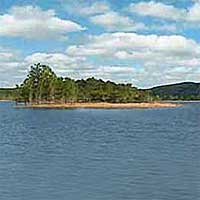
Broken Bow Lake is a 14,000-acre lake with 180 miles of shoreline to explore. The lake is known for its excellent population of bass and crappie fishing. Anglers can also catch walleye, wipers, catfish and sunfish. There are limited areas for fishing from the bank.
Primary fish species to catch
Click images for fishing tips and details about each species.
Today's Weather & Forecast
Fishing Boat Rentals
Click here for fishing boat rentals.
Public Boat Launch Ramps & Landings
Click here for boat ramps.
Marinas
Click here for marinas.
Fishing License
Click here for a Oklahoma Fishing License.
Map - Fishing & Access
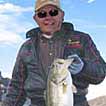
Rick Seaman is a fishing enthusiast with over five decades of fishing experience, a retired tournament fisherman, author of numerous published articles on fishing, and co-author of the book "Bass Fishing - It's not WHAT you throw, It's WHERE you throw it".
Contact Information
Beavers Bend Marina
196 Marina Ln
Broken Bow, OK 74728
580 494-6455
Fishing lakes in each state
010626
OKLAHOMA


Information about fishing lakes in Oklahoma
Broken Bow Reservoir offers fishing for three species of bass, walleye, hybrid stripers, white bass, crappie, catfish and paddlefish in southeastern Oklahoma.


